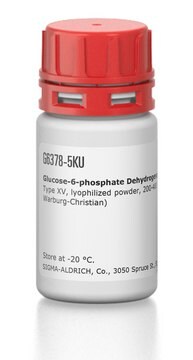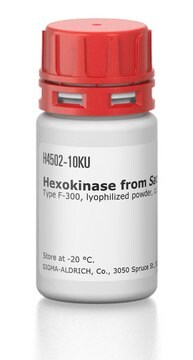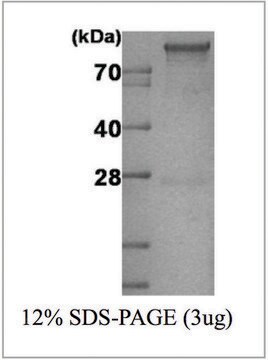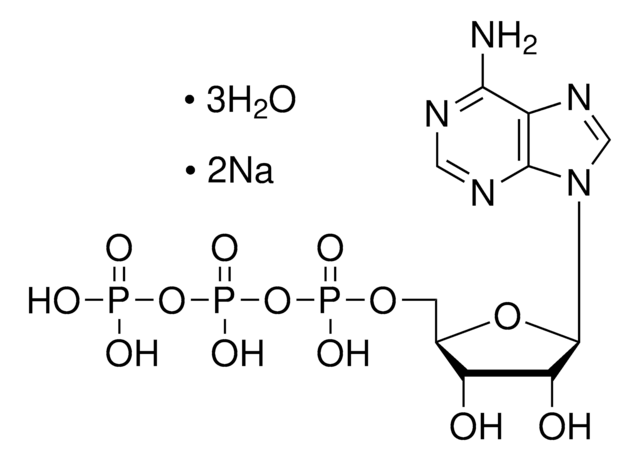HKG6PDH-RO
Roche
Hexokinase/Glucose-6-Phosphate Dehydrogenase (HK/G6P-DH)
from yeast/Leuconostoc, overproducer
Synonyme(s) :
G6P-DH, Glucose-6-Phosphate DehydrogenaseHK, Hexokinase
About This Item
Produits recommandés
Source biologique
yeast
Niveau de qualité
Forme
suspension
Poids mol.
dimer 110,000 Da
Conditionnement
pkg of 10 mL (10737275001 [30 mg])
pkg of 5 mL (10127825001 [15 mg])
Fabricant/nom de marque
Roche
Concentration
3.21 mg/mL
Technique(s)
activity assay: suitable
Couleur
white
pH
5.5-6.5
Solubilité
water: miscible
Adéquation
suitable for UV spectrophotometry and general use
Application(s)
life science and biopharma
Température de stockage
2-8°C
Description générale
Application
Composants
Définition de l'unité
One unit (U) G6P-DH will oxidize 1 μmol of glucose-6-phosphate in one minute at +25 °C and pH 7.6.
The coupled assay produces 1 μmol of NADH per μmol of D-glucose phosphorylated.
Volume Activity: 340 U hexokinase/ml at +25 °C with glucose and ATP as the substrates. 170 U glucose-6-phosphate dehydrogenase/ml at +25 °C with glucose-6-phosphate as the substrate
Forme physique
Autres remarques
Code de la classe de stockage
12 - Non Combustible Liquids
Classe de danger pour l'eau (WGK)
WGK 1
Point d'éclair (°F)
does not flash
Point d'éclair (°C)
does not flash
Certificats d'analyse (COA)
Recherchez un Certificats d'analyse (COA) en saisissant le numéro de lot du produit. Les numéros de lot figurent sur l'étiquette du produit après les mots "Lot" ou "Batch".
Déjà en possession de ce produit ?
Retrouvez la documentation relative aux produits que vous avez récemment achetés dans la Bibliothèque de documents.
Les clients ont également consulté
Notre équipe de scientifiques dispose d'une expérience dans tous les secteurs de la recherche, notamment en sciences de la vie, science des matériaux, synthèse chimique, chromatographie, analyse et dans de nombreux autres domaines..
Contacter notre Service technique









